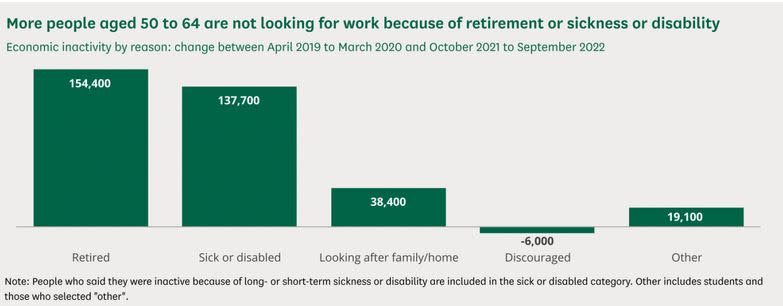Why are so many older people in the UK not looking for work?

As the government encourages early-retirees back to work in an attempt to quell inflation, Mel Stride has suggested over-50s could take up flexible jobs like delivering takeaways.
The work and pensions secretary has been criticised for his remarks, with one charity accusing him of blaming older people for economic woes, when the "real problem is the ageism of employers and recruitment agencies".
In an interview with The Times, Stride said so-called gig economy jobs, such as riding for Deliveroo, were “good for people to consider options they might not have otherwise thought of”.
Read more: Rishi Sunak is on holiday – here's the man standing in for him that half the UK hasn't heard of
He added: “What we’re seeing here is the ability to log on and off any time you like, no requirement to have to do a certain number of hours over a certain period of time, which is driving huge opportunities.”
However, critics on social media accused him of being "out of touch" and "patronising" while others pointed out that gig economy workers often face precarious work situations.
Does Mel Stride realise just how unrenumerative his advice is likely to be?
Perhaps he could check with Downing Street?https://t.co/Kk6wpNehpshttps://t.co/92JnemdkdP— Natalie Bennett (@natalieben) August 3, 2023
With a significant rise in economically inactive people since the COVID-19 pandemic, particularly among over-50s, the government says the labour market is being put under strain.
In its inquiry on economic inactivity, the House of Lords economic affairs committee highlighted said such inactivity can pose “serious challenges”.
It warned employers struggling to find workers who offer higher salaries are contributing to inflation, while others might cut costs, which could also have a detrimental effect on the economy.
Here, Yahoo News looks at why so many older people are not working in the UK and what it means for the country.
How many older people are not interested in returning to work?
Office for National Statistics (ONS) figures show in November to January 2023, 8.9 million people aged 16 to 64 were economically inactive (not working and not looking for work), accounting for 21.3% of that age range.
That's more than January to March 2020, before the pandemic, with subsequent lockdowns, working from home and furlough believed to have contributed to an increase in early retirees.
The ONS say rising inactivity among 50-to-64-year-olds accounted for 68.5% of the total rise in economic inactivity among those aged 16-to-64-year-olds.
Why are older people increasingly leaving work?
The two main explanations for older people leaving work are that they'd simply prefer an early retirement, or they are unable to work for health reasons, according to House of Commons Library research.
Which is the biggest contributor is hotly debated. A House of Lords economic affairs committee inquiry concluded that while sickness was a “contributing” factor, early retirement was the “key driver” among older workers.
The Institute for Fiscal Studies said that for many people, early retirement may be “a lifestyle choice”, particularly as people appreciated having more time at home during COVID and made extra savings.
Read more: Should the Bank of England have raised interest rates again?

However, the Health Foundation and the Institute for Employment Studies have argued that the main reason has been worsening health, exacerbated by difficulties accessing care and delays in treatment.
Chris Walsh, chief executive of Wise Age, a charity supporting over-50s in work, suggested some deeper systemic issues could be at play.
"The government and its ministers continue to blame older working age people for their long-term unemployment or worklessness, when the real problem is the ageism of employers and recruitment agencies," he said.
"As the first specialist age and employment charity we have seen hundreds of qualified, committed and experienced older people talk of hundreds of applications being rejected and interviews lost because of ageist myths and prejudices.
Read more: 'Crucial' second-hand electric car supply at risk if Rishi Sunak U-turns on 2030 plan, expert warns

"The government needs to resource local age friendly employment support provision linked to massive promotion of the many benefits older people bring, such as increased profitability, productivity and staff morale.
Read more: Can you guess how much house prices have changed?
"Yes, for some seniors there may be limits on the amount of physical exertion they can undertake 35 hours a week, but ergonomic improvements, part-time working and a change in the type of work can all mitigate this."
In a swipe at the work and pensions secretary, he added: "Besides, most people in their 50s are pretty healthy and can offer the wisdom which this minister sorely needs."

How is the government trying to get over-50s back into work?
In its spring budget 2023, the government unveiled a set of measures to help people across all age groups back into work, including £2bn in support for people with disabilities and long-term health conditions.
Among the measures for older people was a new digital "Mid-life MOT" - a review for workers in their 40s and 50s helping them take stock of their finances, skills and health to help them understand what their employment choices mean for the longer-term.
The package also included Sector-based Work Academy Programme (SWAP) to give people a chance to boost their work skills and a new "Returnerships" programme.
What about gig economy or flexible jobs?
Many age-related charities have taken issue with the work and pensions secretary's suggestion that over-50s could take more flexible jobs, such as delivering takeaways - roles usually held by younger people.
Charity director at Age UK, Caroline Abrahams said: “In many parts of the country there are job opportunities for older workers in retail, hospitality & social care, and we know that some over-50s are already employed in these roles.
"It’s true that jobs in these sectors are often flexible and that may particularly suit some older workers, but on the other hand they can also be of the ‘zero hour’ kind, in which case the flexibility is all in the hands of the employer rather than the employee.
Read more: Bank of England raises UK interest rates to new 15-year high
"These roles also tend to be quite physically demanding, so while some over-50s will be fine with that, for others it may be too much.
“Unfortunately, however, the common denominators of many of these available roles is that they are poorly paid, offering only minimum wage or just above, so while some over-50s who badly need more income may feel they are worth taking, others are likely to reach a different conclusion.”
She called on the government to support older workers to update their skills, particularly in IT, in order to improve their employability in a wider range of more secure jobs, rather than allowing over-50s to be "thrown on the scrap heap when they still have a lot to give".


